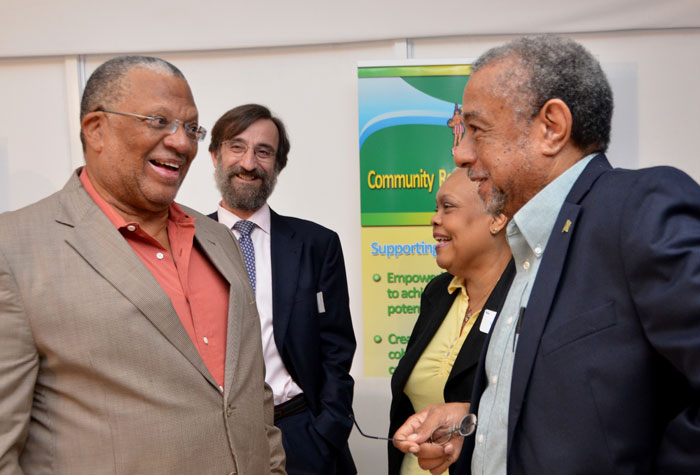Private Sector Urged to Support Community Renewal Programme
By: , April 29, 2014The Key Point:
The Facts
- The CRP is a multifaceted programme, designed to transform the lives of residents in 100 of the most vulnerable and volatile communities islandwide, using various interventions.
- Dr. Phillips said the programme is a key component of the Government’s growth agenda.
The Full Story
Minister of Finance and Planning, Dr. the Hon. Peter Phillips has called on the private sector to contribute to the economic development and social empowerment of marginalised communities, particularly through the Community Renewal Programme (CRP).
Being implemented by the Planning Institute of Jamaica (PIOJ), the CRP is a multifaceted programme, financed by the Government of Jamaica and international development partners.
It is designed to transform the lives of residents in 100 of the most vulnerable and volatile communities islandwide, using various interventions.
Speaking at a Corporate Mingle at the Spanish Court Hotel in New Kingston, on April 25, the Minister said there has been an “increasingly visible pattern of corporate engagement in community programmes and community upliftment”.
However, he said there is need for greater private sector involvement to address some of the social and economic ills in poor communities.
“This process of social reintegration which is at the heart of the exercise, is going to require more energies than can be deployed simply through the PIOJ, and it is going to need the participation of the wider Jamaican society (including) corporate Jamaica,” he said.
The Minister noted that one of the aims of the programme involves creating economic opportunities for residents, encouraging them to become self-sufficient by engaging in entrepreneurial activities.
He suggested that private sector entities could “act as mentors and guides for some of the small business people”, within the communities.
Dr. Phillips noted that the problem with the failure of some micro-enterprises, does not necessarily have to do with the unavailability of money, but rather the lack of knowledge of how to run a business.
Dr. Phillips cautioned however, that while economic empowerment is important, transforming poor communities, “is not just a matter of pouring material resources into the communities, but it is even more so a problem of changing behaviours and attitudes which keep people in their situation in life”.
He suggested that the private sector could partner with other public entities to assist with transforming the bahaviours and attitudes of individuals that “(lead to) perpetuating poverty in these communities”, by embracing them and interacting with them on a personal level.
Dr. Phillips said the programme is a key component of the Government’s growth agenda.
This he said, in recognition of the fact that marginalised communities manifest a range of social disabilities “which have to be overcome if we are to achieve higher rates of growth and if we are to find the kind of basic social harmony which is essential for rapid growth in the economy”.
The CRP intervenes in targeted communities to address living conditions directly; change behavioural patterns among the residents; improve the physical environment; and transfer educational skills, and employment opportunities.




